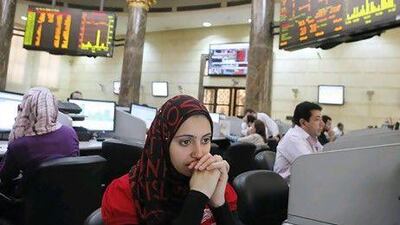Egyptian investment banks are facing rising earnings pressure from low brokerage revenues on thin trading as the industry deals with the aftermath of the revolution that ousted Hosni Mubarak.
The benchmark EGX 30 Index is down about 35 per cent from its highs of 7,200 in January, trading at about 4,600. Similarly, volumes have been heavily cut, with traded value down to 100 million Egyptian pounds, from 1.6 billion pounds eight months ago.
EFG-Hermes was the latest to report after a streak of weak earnings from commercial and investment banks. The bank said profits were down 19 per cent to 79m pounds on a decline in brokerage revenue, while operating costs outstripped revenue growth. Credit Suisse cut its target price for EFG-Hermes to 21 pounds from 26 pounds yesterday.
Egyptian banks were hurt by the uprising that toppled Mr Mubarak this year, when political turmoil and industrial strikes prompted the central bank to close the banks for nearly two weeks. The Egyptian Exchange was forced to close for two months as foreign investors exited their positions in Egyptian companies.
"They are managing despite the crisis and their comeback will depend on the length of the transitionary period and future economic policy going forward," said Jaap Meijer, a senior banking analyst at AlembicHC in Dubai.
The ruling military council says it will hand over power after parliamentary elections, expected later this year, and a subsequent presidential vote.
Beltone Financial Holding last week recorded a first-half loss of 10.2m pounds compared with a profit of 10.9m pounds in the same period last year. Credit Agricole Egypt's net profit for the first six months also fell, from 201.6m pounds to 140.7m pounds.
The ratings agency Moody's recently revised its outlook on Egypt's banking system to "negative" from "stable", citing growing pressure to lower-rated Egyptian sovereign debt and the effect of political turmoil on the economy.
Moody's said it expected that declines in tourism, foreign direct investment, incoming fund flows and private consumption following the political unrest would reduce Egypt's economic growth to about 2 per cent in the next 12 to 18 months.
"These adverse economic conditions are likely to challenge the banking system's asset quality and business prospects as well as its profitability and internal capital generation capacity," Moody's reported.

